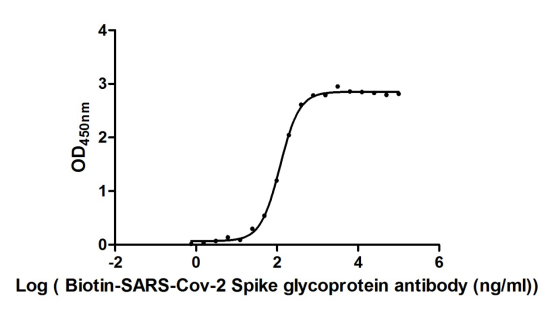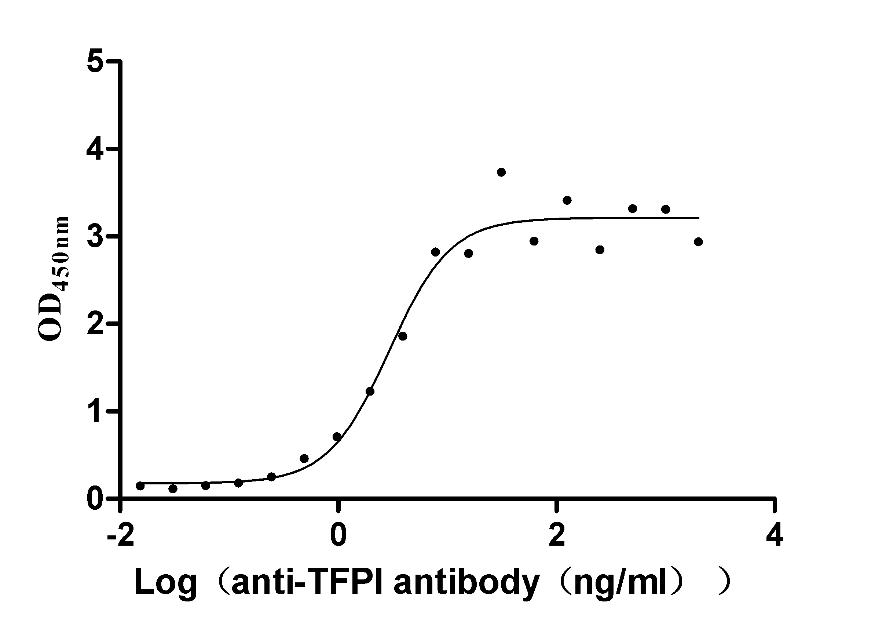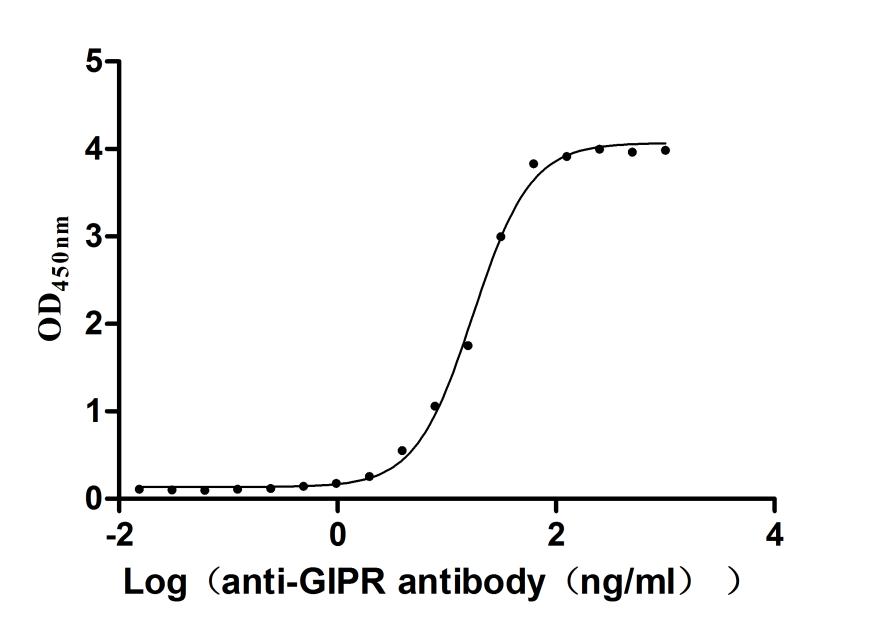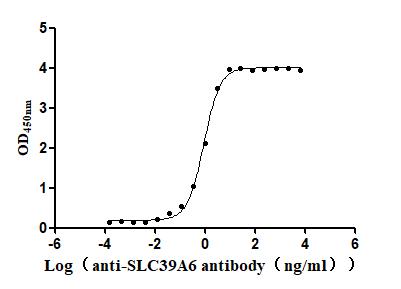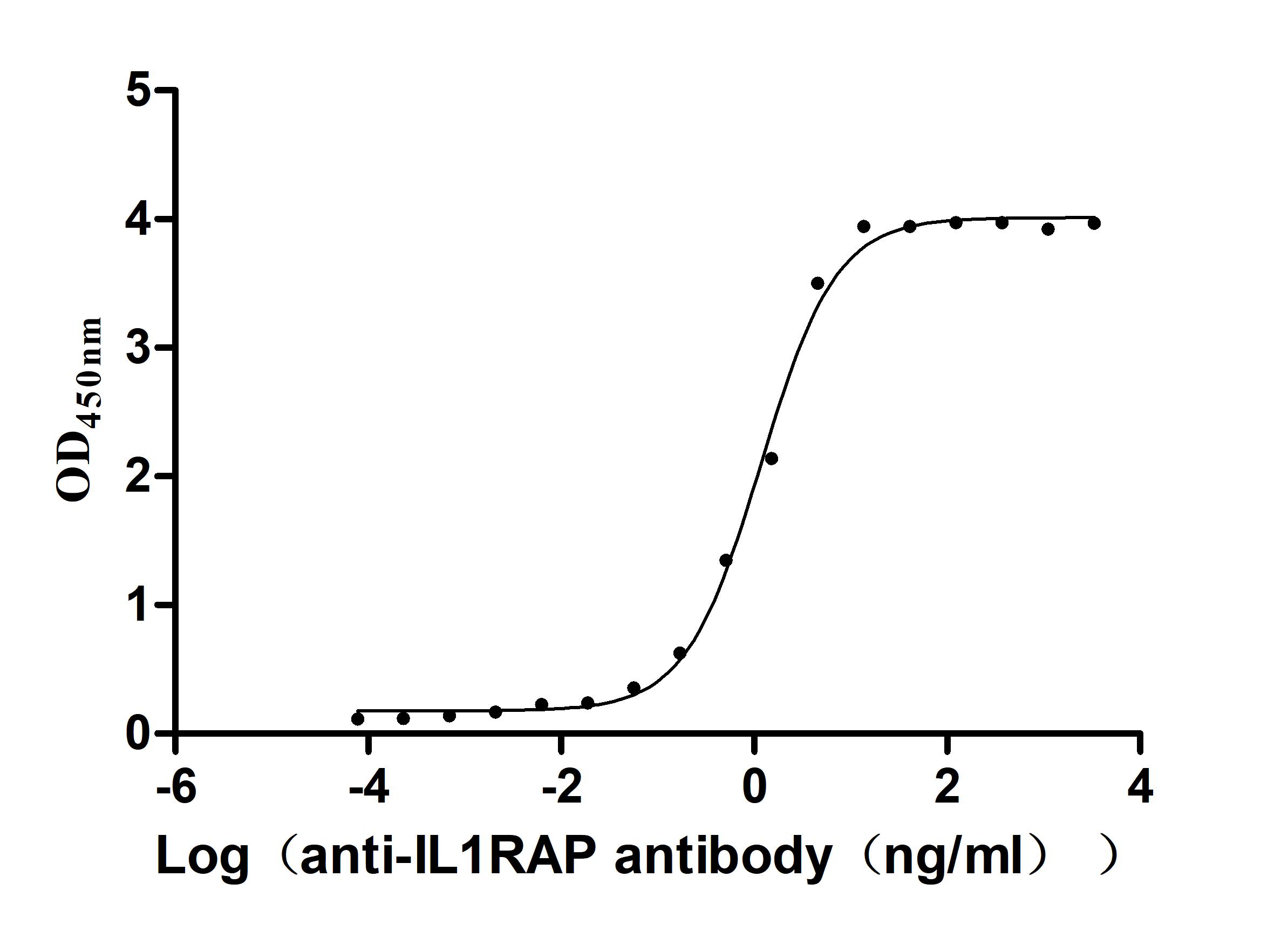Recombinant Mouse Suppressor of tumorigenicity 14 protein homolog (St14), partial
-
中文名称:小鼠St14重组蛋白
-
货号:CSB-YP022746MO
-
规格:
-
来源:Yeast
-
其他:
-
中文名称:小鼠St14重组蛋白
-
货号:CSB-EP022746MO
-
规格:
-
来源:E.coli
-
其他:
-
中文名称:小鼠St14重组蛋白
-
货号:CSB-EP022746MO-B
-
规格:
-
来源:E.coli
-
共轭:Avi-tag Biotinylated
E. coli biotin ligase (BirA) is highly specific in covalently attaching biotin to the 15 amino acid AviTag peptide. This recombinant protein was biotinylated in vivo by AviTag-BirA technology, which method is BriA catalyzes amide linkage between the biotin and the specific lysine of the AviTag.
-
其他:
-
中文名称:小鼠St14重组蛋白
-
货号:CSB-BP022746MO
-
规格:
-
来源:Baculovirus
-
其他:
-
中文名称:小鼠St14重组蛋白
-
货号:CSB-MP022746MO
-
规格:
-
来源:Mammalian cell
-
其他:
产品详情
-
纯度:>85% (SDS-PAGE)
-
基因名:St14
-
Uniprot No.:
-
别名:St14; Prss14; Suppressor of tumorigenicity 14 protein homolog; EC 3.4.21.109; Epithin; Serine protease 14
-
种属:Mus musculus (Mouse)
-
蛋白长度:Partial
-
蛋白标签:Tag type will be determined during the manufacturing process.
The tag type will be determined during production process. If you have specified tag type, please tell us and we will develop the specified tag preferentially. -
产品提供形式:Lyophilized powder
Note: We will preferentially ship the format that we have in stock, however, if you have any special requirement for the format, please remark your requirement when placing the order, we will prepare according to your demand. -
复溶:We recommend that this vial be briefly centrifuged prior to opening to bring the contents to the bottom. Please reconstitute protein in deionized sterile water to a concentration of 0.1-1.0 mg/mL.We recommend to add 5-50% of glycerol (final concentration) and aliquot for long-term storage at -20℃/-80℃. Our default final concentration of glycerol is 50%. Customers could use it as reference.
-
储存条件:Store at -20°C/-80°C upon receipt, aliquoting is necessary for mutiple use. Avoid repeated freeze-thaw cycles.
-
保质期:The shelf life is related to many factors, storage state, buffer ingredients, storage temperature and the stability of the protein itself.
Generally, the shelf life of liquid form is 6 months at -20°C/-80°C. The shelf life of lyophilized form is 12 months at -20°C/-80°C. -
货期:Delivery time may differ from different purchasing way or location, please kindly consult your local distributors for specific delivery time.Note: All of our proteins are default shipped with normal blue ice packs, if you request to ship with dry ice, please communicate with us in advance and extra fees will be charged.
-
注意事项:Repeated freezing and thawing is not recommended. Store working aliquots at 4°C for up to one week.
-
Datasheet :Please contact us to get it.
靶点详情
-
功能:Degrades extracellular matrix. Exhibits trypsin-like activity as defined by cleavage of synthetic substrates with Arg or Lys as the P1 site. Involved in the terminal differentiation of keratinocytes through prostasin (PRSS8) activation and filaggrin (FLG) processing.
-
基因功能参考文献:
- The proliferation impairment in matriptase-deficient breast cancer cells is caused by their inability to initiate activation of the c-Met signalling pathway in response to fibroblast-secreted pro-HGF. PMID: 25873032
- Matriptase is a critical promoter of late stages of squamous cell carcinoma progression and induces pro-tumorigenic chemokine and cytokine release, and inflammatory cell accumulation in established tumors. PMID: 25486433
- HAI-1 regulates the activity of activated matriptase, whereas HAI-2 has an essential role in regulating prostasin-dependent matriptase zymogen activation. PMID: 24962579
- Our results reveal unexpected complementary roles of matriptase-prostasin- and PAR-2-dependent proteolytic signaling in the establishment of placental epithelial barrier function and overall embryonic survival. PMID: 25078604
- These findings suggest that TGF-beta induces epithin/PRSS14 shedding by mediating translocation of epithin/PRSS14 sheddase, TACE, to the membrane. PMID: 25245289
- Matriptase deletion initiates a Sjogren's syndrome-like disease in mice. PMID: 24551030
- Matriptase is required for the active form of hepatocyte growth factor induced Met, focal adhesion kinase and protein kinase B activation on neural stem/progenitor cell motility. PMID: 24685580
- ST14 expression is downregulated in colitis. PMID: 22081509
- St14 is a critical tumor-suppressor gene in the mouse gastrointestinal tract and adds matriptase to the expanding list of pericellular proteases with tumor-suppressive functions PMID: 22139080
- Overexpression of matriptase in 4T1 mouse breast carcinoma cells resulted in visible changes in morphology, actin staining and cell to cell contacts PMID: 22514623
- Endogenous expression of matriptase in neural progenitor cells promotes cell migration and neuron differentiation. PMID: 21149451
- Soluble form of the protein secreted from cancer cells contains active angiogenic potential PMID: 20652801
- These results suggest that epithin is a key mediator of TGF-beta-induced epithelial-mesenchymal transition in tumor progression. PMID: 20398629
- Matriptase/epithin participates in mammary epithelial cell growth and morphogenesis through HGF activation PMID: 19853659
- Matriptase/MT-SP1 is required for postnatal survival, epidermal barrier function, hair follicle development, and thymic homeostasis. (Matriptase/MTSP1) PMID: 12032844
- matriptase is downregulated through suppression of activation of receptor-bound pro-urokinase, and leads to inhibition of tumor invasion PMID: 14747469
- identification of an epithin isoform, epithin(Delta), containing a 66 amino acid deletion from the full-length epithin, which is missing the 4th LDLRA domain and the protease activation sequence PMID: 15629466
- These results strongly suggest that epithin plays an important role in the compaction processes that elicit the signal for the differentiation into trophectoderm and inner cell mass. PMID: 15848395
- mutations in conserved residues of mCAP2 located in two protein-protein interacting domains significantly modulated ENaC activation PMID: 16524950
- Combined with previous studies, these data suggest that matriptase has diverging functions in the genesis of stratified keratinized epithelium, hair follicles, and squamous cell carcinoma. PMID: 16651618
- matriptase acts upstream of prostasin in a zymogen activation cascade that regulates terminal epidermal differentiation and is required for prostasin zymogen activation PMID: 16980306
- matriptase-1 plays a vital role in the aggressive nature and progression of prostate cancer PMID: 17228523
- data suggest that a matriptase-prostasin zymogen activation cascade may be functionally operative in multiple epithelial tissues, but matriptase promotes epithelial carcinogenesis independent of prostasin PMID: 17471493
- reduced activity of a matriptase-prostasin proteolytic cascade is the etiological origin of human ARIH and provides an important mouse model for the exploration of matriptase function in ARIH PMID: 17940283
- Unlike HAI-1 and matriptase, HAI-2 expression is detected in non-epithelial cells of brain and lymph nodes, suggesting that HAI-2 may also be involved in inhibition of serine proteases other than matriptase PMID: 18713750
- St14(hypo/-) mice provide early evidence that the cutaneous microbiome can be specifically altered by genetic state, which may play an important role in modulating skin disease. PMID: 19387477
- This study identifies matriptase suppression as an essential function of HAI-1 in postnatal tissue homeostasis PMID: 19389929
- Inhibition of the transmembrane serine protease matriptase (encoded by St14) is an essential function of HAI2 during tissue morphogenesis. PMID: 19592578
- The homeostasis of multiple simple and stratified epithelia is matriptase-dependent. PMID: 19717635
显示更多
收起更多
-
亚细胞定位:Membrane; Single-pass type II membrane protein.
-
蛋白家族:Peptidase S1 family
-
组织特异性:Highly expressed in intestine, kidney, lung, and thymus. Not expressed in skeletal muscle, liver, heart, testis and brain.
-
数据库链接:
KEGG: mmu:19143
STRING: 10090.ENSMUSP00000034478
UniGene: Mm.243926
Most popular with customers
-
Recombinant Severe acute respiratory syndrome coronavirus 2 Spike glycoprotein (S), partial (Active)
Express system: Mammalian cell
Species: Severe acute respiratory syndrome coronavirus 2 (2019-nCoV) (SARS-CoV-2)
-
Recombinant Rabbit Tissue factor pathway inhibitor (TFPI) (Active)
Express system: Mammalian cell
Species: Oryctolagus cuniculus (Rabbit)
-
Recombinant Human Gastric inhibitory polypeptide receptor(GIPR),partial (Active)
Express system: Mammalian cell
Species: Homo sapiens (Human)
-
Recombinant Macaca fascicularis Zinc transporter ZIP6 isoform X1(SLC39A6),partial (Active)
Express system: Baculovirus
Species: Macaca fascicularis (Crab-eating macaque) (Cynomolgus monkey)
-
Recombinant Human Interleukin-1 receptor accessory protein (IL1RAP), partial (Active)
Express system: Mammalian cell
Species: Homo sapiens (Human)


